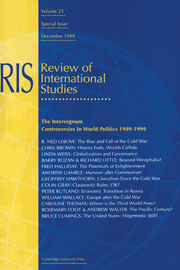Book contents
- Frontmatter
- Contents
- Acknowledgements
- Foreword
- Notes on contributors
- Introduction
- 1 The Rise and Fall of the Cold War in Comparative Perspective
- 2 History Ends, World Collide
- 3 Globalization and National Governance: Antinomies or Interdependence?
- 4 Beyond Westphalia?: Capitalism after the ‘Fall’
- 5 The Potentials of Enlightenment
- 6 Marxism after Communism
- 7 Liberalism Since the Cold War: An Enemy to Itself?
- 8 Clausewitz Rules, OK? The Future is the Past—with GPS
- 9 Mission Impossible? The IMF and the Failure of the Market Transition in Russia
- 10 Europe after the Cold War: Interstate Order or post-Sovereign Regional System?
- 11 Where is the Third World Now?
- 12 Whatever Happened to the Pacific Century?
- 13 Still the American Century
- Index
11 - Where is the Third World Now?
Published online by Cambridge University Press: 05 November 2009
- Frontmatter
- Contents
- Acknowledgements
- Foreword
- Notes on contributors
- Introduction
- 1 The Rise and Fall of the Cold War in Comparative Perspective
- 2 History Ends, World Collide
- 3 Globalization and National Governance: Antinomies or Interdependence?
- 4 Beyond Westphalia?: Capitalism after the ‘Fall’
- 5 The Potentials of Enlightenment
- 6 Marxism after Communism
- 7 Liberalism Since the Cold War: An Enemy to Itself?
- 8 Clausewitz Rules, OK? The Future is the Past—with GPS
- 9 Mission Impossible? The IMF and the Failure of the Market Transition in Russia
- 10 Europe after the Cold War: Interstate Order or post-Sovereign Regional System?
- 11 Where is the Third World Now?
- 12 Whatever Happened to the Pacific Century?
- 13 Still the American Century
- Index
Summary
As we enter the new millennium, the Third World, far from disappearing, is becoming global. The dynamic of economic driven globalization is resulting in the global reproduction of Third World problems. Growing inequality, risk and vulnerability characterize not simply the state system, but an emerging global social order. This is part of an historical process underway for five centuries: the expansion of capitalism across the globe. Technological developments speed up the process. The demise of the communist bloc and the associated rejection of ‘real existing socialism’ as a mode of economic organization have provided a specific additional fillip to the reconfiguration of the ‘Third World’. The 1980s, and more particularly the 1990s, have witnessed the mainstreaming of liberal economic ideology via the Washington consensus. This approach to development has been legitimated in several global conferences such as United Nations Conference on Environment and Development (UNCED) and the Copenhagen Social Summit. It has been applied practically through institutions such as the International Monetary Fund (IMF), the World Bank and World Trade Organization (WTO). In its wake we have seen a deepening of existing inequalities between and within states, with a resulting tension—contradiction even—between the development targets agreed by the United Nations (UN), and the policies pursued by international organizations and governments to facilitate such results.
The article is divided into three parts. The first part identifies where the Third World is now, arguing that it is in fact being globalized.
- Type
- Chapter
- Information
- The Interregnum: Controversies in World Politics 1989–1999 , pp. 225 - 244Publisher: Cambridge University PressPrint publication year: 2000

